译林牛津英语6B知识点汇总
(完整版)译林英语6B知识点归纳,推荐文档.docx
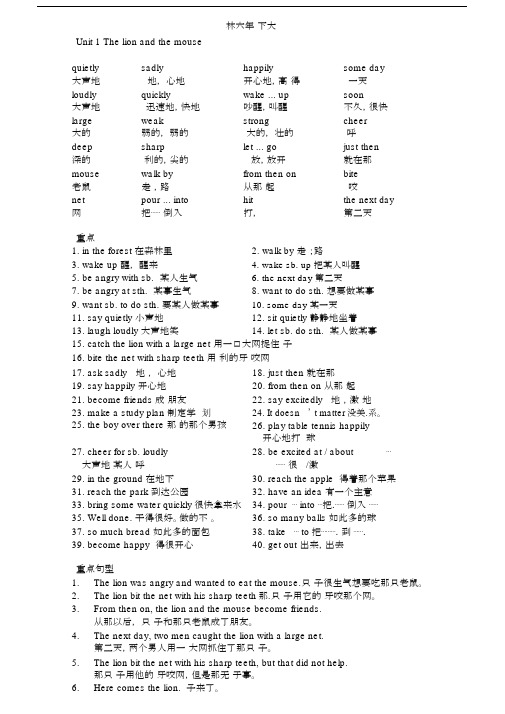
林六年下大Unit 1 The lion and the mousequietly sadly happily some day大声地地,心地开心地,高得一天loudly quickly wake ... up soon大声地迅速地,快地吵醒,叫醒不久,很快large weak strong cheer大的弱的,弱的大的,壮的呼deep sharp let ... go just then深的利的,尖的放,放开就在那mouse walk by from then on bite老鼠走,路从那起咬net pour ... into hit the next day网把⋯⋯倒入打,第二天重点1. in the forest 在森林里2. walk by 走;路3. wake up 醒,醒来4. wake sb. up 把某人叫醒5. be angry with sb. 某人生气6. the next day 第二天7. be angry at sth. 某事生气8. want to do sth. 想要做某事9. want sb. to do sth. 要某人做某事10. some day 某一天11. say quietly 小声地12. sit quietly 静静地坐着13. laugh loudly 大声地笑14. let sb. do sth. 某人做某事15.catch the lion with a large net 用一口大网捉住子16.bite the net with sharp teeth 用利的牙咬网17. ask sadly 地,心地18. just then 就在那19. say happily 开心地20. from then on 从那起21. become friends 成朋友22. say excitedly 地,激地23. make a study plan 制定学划24. It doesn ’ t matter没关.系。
译林牛津英语6B知识点

六下6B Unit 1 The lion and the mouse 知识点梳理一、短语1.make a study plan 制定学习计划2. in the forest 在森林里rge and strong大和强壮4.one day 一天5. walk by 走过;路过6. wake up 醒,醒来 wake sb up 把某人叫醒7. be angry with sb 对某人生气 be angry at sth 对某事生气8. want to do sth 想要做某事 want sb to do sth 要某人做某事9. some day 某一天 10. say quietly 小声地说11. so small and weak这么小和弱 12. the nextday 第二天13. laugh loudly 大声地笑 laugh happily开心地大笑14. let sb do sth 让某人做某事 let the mouse go 让这只老鼠走开15. catch the lion with a large net 用一口大网捉住狮子16. bite the net with sharp teeth 用锋利的牙齿咬网17. get out 出来,出去 get out from the net破网而出help the lion get out帮助狮子逃脱18. ask sadly 难过地问,伤心地问 19. just then 就在那时20.make a big hole in the net with his teeth 用他的牙齿在网上弄了一个大洞21. say happily 开心地说, 22. from then on 从那时起23. become friends 成为朋友 become good friends成为好友24.a happy boy 一个快乐地男孩 25. say excitedly 兴奋地说,激动地说26.sweet shop甜品店 27. the boy over there 那边的那个男孩28. It doesn’t matter. 没关系。
完整word版译林英语6B知识点归纳

译林六年级下大纲Unit 1 The lion and the mouse单词quietly sadly happily some day大声地难过地,伤心地开心地,高兴得一天loudly quickly wake ... up soon大声地迅速地,快地吵醒,叫醒不久,很快large weak strong cheer大的弱的,软弱的强大的,强壮的欢呼deep sharp let ... go just then深的锋利的,尖的释放,放开就在那时mouse walk by from then on bite老鼠走过,路过从那时起咬net pour ... into hit the next day网把……倒入打,击第二天重点词组1. in the forest 在森林里2. walk by 走过;路过3. wake up 醒,醒来4. wake sb. up 把某人叫醒5. be angry with sb. 对某人生气6. the next day 第二天7. be angry at sth. 对某事生气8. want to do sth. 想要做某事9. want sb. to do sth. 要某人做某事10. some day 某一天11. say quietly 小声地说12. sit quietly 静静地坐着13. laugh loudly 大声地笑14. let sb. do sth. 让某人做某事15. catch the lion with a large net 用一口大网捉住狮子16. bite the net with sharp teeth 用锋利的牙齿咬网17. ask sadly 难过地问,伤心地问18. just then 就在那时19. say happily 开心地说20. from then on 从那时起21. become friends 成为朋友22. say excitedly 兴奋地说,激动地说23. make a study plan 制定学习计划24. It doesn't matter. 没关系。
牛津译林6B第三单元知识点汇总

6B Unit 3 The healthy diet 姓名_________一基础知识部分●单词(详见单词表上本单元单词)●词组:1. like eating sweets喜欢吃糖果2. like drinking water 喜欢喝水3. drink a little water every day 每天喝一点儿水4. some bread and milk 一些面包和牛奶5. a lot of rice 大量的米饭6. some fish and some meat 一些鱼和肉7. a few eggs 几个鸡蛋8. every week 每周9. a healthy diet 健康的饮食10. eat an egg 吃一个蛋11. eat a little rice 吃一点儿米饭12. like sweet food 喜欢甜食13. eat a little at a time 一次吃一点儿14. get out 出去15. much food 很多食物16. in the fridge 在冰箱17. have to go to the supermarket 必须去超市18. want to come with me 想和我一起去19. have some cola 喝(要,买)些可乐20. take a small bottle 拿一个小瓶的21. drink too much cola 喝太多可乐22. want this big fish 想要这条大鱼23. need a lot of rice 需要很多大米24. take the big bag 拿那袋大的25. too heavy 太重26. have a rest=take a rest 休息一下27. want this big fish 想要这条大鱼28. in your meals 在你的膳食中●句型:1.What do you usually have for breakfast? I have some noodles. 你早饭通常吃什么?我吃些面条。
(完整word版)小学牛津英语译林版6B英语知识点

Unit1 The lion and the mousemouse复数老鼠mice 鼠标mousesbig,large区别large:常指面积或范围大,有广阔和众多的含义,其反义词是small。
large比较正式。
big:常指程度,规模,容积,重量,数量大,含有庞大、笨重的意思,还可表示“伟大,重要”之意,其反义词是little,big较为口语化wake up:up是副词,不可后接代词,代词放中间,名称中间后面都可以放。
the next day 第二天,是指某个特定时间的后一天,既可指过去,也可指将来tomorrow是指从今天向后的一天,即明天some day 表示将来不确定的某一天,表示将来的时间状语,因此时态用一般将来时just then 就在那时,表示过去的时间状语,因此时态用一般过去时from then on 从那时起,表示过去的时间状语,因此时态用一般过去时from now on 从今往后,表示将来的时间状语,因此时态用一般将来时副词接在动词后面speak loudly形容词接在名词前面或be动词后面作表语the old manwalk by走过路过let...go 释放放开pour...into把......倒入in the forest 在森林里large and strong又大又壮so small and weak这么小和弱let sb. do 让某人干某事well done 干得好get out from the net破网而出become friends变成朋友cheer for...为...而欢呼be good at ...=do well in...擅长in the ground在地上in the hole在洞里look sad看起来伤心with his teeth 用他的牙齿catch(caught)...with用...捉住...have an idea有一个主意(想法)have a good(bad) idea反义词strong 与weak(同音词week) bite过去式bit hit过去式hitunit2 good habits宾语补足语:英语中,有些及物动词后接宾语时,还需要加一个词或短语来补充说明宾语的情况,这样的词或短语叫做宾语补足语。
(完整word版)译林英语6B知识点归纳,文档
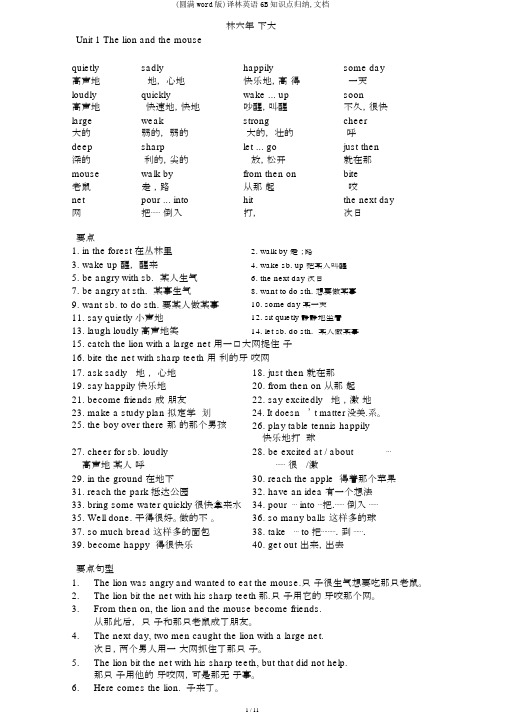
林六年 下大Unit 1 The lion and the mousequietly sadlyhappilysome day 高声地 地, 心地 快乐地,高 得 一天 loudly quicklywake ... up soon高声地 快速地,快地 吵醒,叫醒 不久,很快 large weakstrongcheer 大的 弱的, 弱的 大的, 壮的 呼deep sharplet ... go just then 深的 利的,尖的 放,松开就在那 mouse walk by from then on bite 老鼠 走 ,路从那 起 咬net pour ... into hit the next day 网 把⋯⋯ 倒入 打, 次日要点1. in the forest 在丛林里3. wake up 醒, 醒来5. be angry with sb. 某人生气7. be angry at sth. 某事生气9. want sb. to do sth. 要某人做某事11. say quietly 小声地13. laugh loudly 高声地笑15. catch the lion with a large net 用一口大网捉住 子16. bite the net with sharp teeth 用 利的牙 咬网17. ask sadly 地 , 心地 18. just then 就在那 19. say happily 快乐地20. from then on 从那 起 21. become friends 成 朋友22. say excitedly 地 ,激 地 23. make a study plan 拟定学 划24. It doesn ’ t matter 没关.系。
25. the boy over there 那 的那个男孩26. play table tennis happily快乐地打 球 27. cheer for sb. loudly28. be excited at / about ⋯高声地 某人 呼⋯⋯ 很 /激29. in the ground 在地下30. reach the apple 得着那个苹果 31. reach the park 抵达公园32. have an idea 有一个想法 33. bring some water quickly 很快拿来水 34. pour ⋯ into ⋯把.⋯⋯ 倒入 ⋯⋯ 35. Well done. 干得很好。
译林牛津英语6B知识点
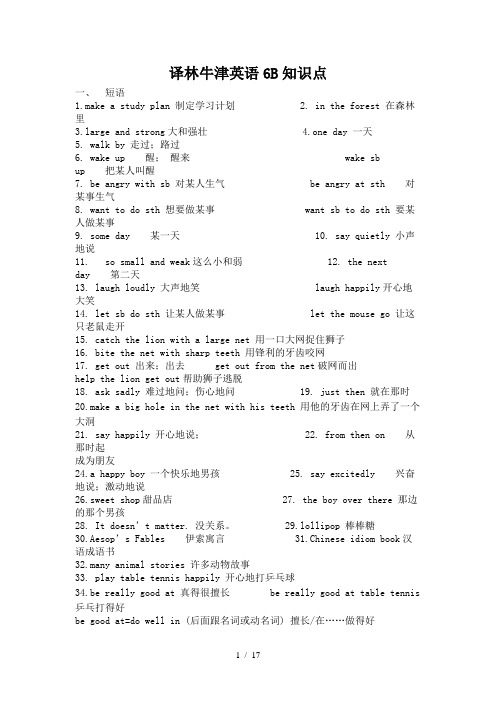
译林牛津英语6B知识点一、短语1.make a study plan 制定学习计划2. in the forest 在森林里rge and strong大和强壮4.one day 一天5. walk by 走过;路过6. wake up 醒;醒来 wake sbup 把某人叫醒7. be angry with sb 对某人生气 be angry at sth 对某事生气8. want to do sth 想要做某事 want sb to do sth 要某人做某事9. some day 某一天 10. say quietly 小声地说11. so small and weak这么小和弱 12. the nextday 第二天13. laugh loudly 大声地笑 laugh happily开心地大笑14. let sb do sth 让某人做某事 let the mouse go 让这只老鼠走开15. catch the lion with a large net 用一口大网捉住狮子16. bite the net with sharp teeth 用锋利的牙齿咬网17. get out 出来;出去 get out from the net破网而出help the lion get out帮助狮子逃脱18. ask sadly 难过地问;伤心地问 19. just then 就在那时20.make a big hole in the net with his teeth 用他的牙齿在网上弄了一个大洞21. say happily 开心地说; 22. from then on 从那时起成为朋友24.a happy boy 一个快乐地男孩 25. say excitedly 兴奋地说;激动地说26.sweet shop甜品店 27. the boy over there 那边的那个男孩28. It doesn’t matter. 没关系。
牛津译林6B第六单元知识点汇总
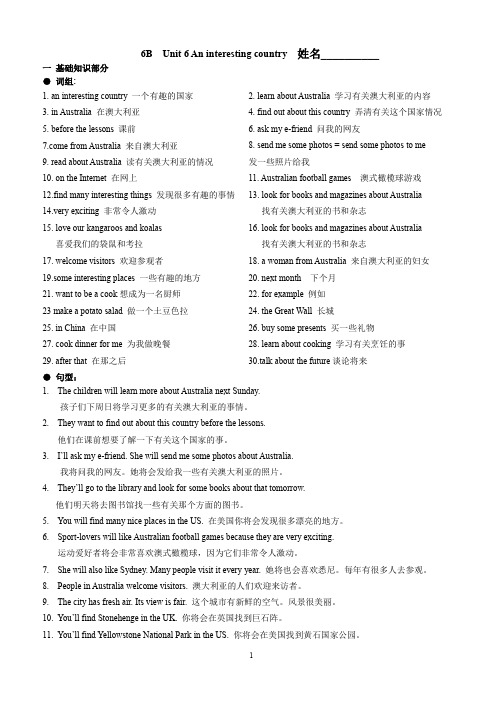
6B Unit 6 An interesting country 姓名__________一基础知识部分●句型:1.The children will learn more about Australia next Sunday.孩子们下周日将学习更多的有关澳大利亚的事情。
2.They want to find out about this country before the lessons.他们在课前想要了解一下有关这个国家的事。
3.I’ll ask my e-friend. She will send me some photos about Australia.我将问我的网友。
她将会发给我一些有关澳大利亚的照片。
4.They’ll go to the library and look for some books about that tomorrow.他们明天将去图书馆找一些有关那个方面的图书。
5.You will find many nice places in the US. 在美国你将会发现很多漂亮的地方。
6.Sport-lovers will like Australian football games because they are very exciting.运动爱好者将会非常喜欢澳式橄榄球,因为它们非常令人激动。
7.She will also like Sydney. Many people visit it every year. 她将也会喜欢悉尼。
每年有很多人去参观。
8.People in Australia welcome visitors. 澳大利亚的人们欢迎来访者。
9.The city has fresh air. Its view is fair. 这个城市有新鲜的空气。
风景很美丽。
10.You’ll find Stonehenge in the UK. 你将会在英国找到巨石阵。
新译林英语6B_全册知识点梳理(重点词汇、句型、语法知识整理)
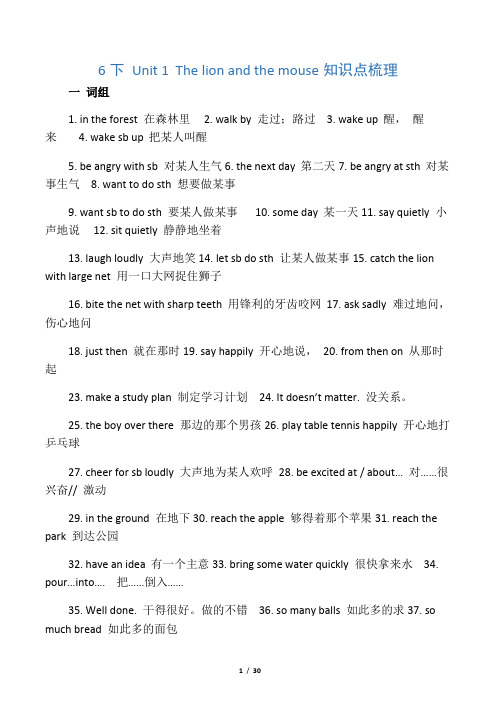
6下Unit 1 The lion and the mouse知识点梳理一词组1. in the forest 在森林里2. walk by 走过;路过3. wake up 醒,醒来 4. wake sb up 把某人叫醒5. be angry with sb 对某人生气6. the next day 第二天7. be angry at sth 对某事生气8. want to do sth 想要做某事9. want sb to do sth 要某人做某事10. some day 某一天11. say quietly 小声地说 12. sit quietly 静静地坐着13. laugh loudly 大声地笑 14. let sb do sth 让某人做某事15. catch the lion with large net 用一口大网捉住狮子16. bite the net with sharp teeth 用锋利的牙齿咬网 17. ask sadly 难过地问,伤心地问18. just then 就在那时19. say happily 开心地说,20. from then on 从那时起23. make a study plan 制定学习计划24. It doesn’t matter. 没关系。
25. the boy over there 那边的那个男孩26. play table tennis happily 开心地打乒乓球27. cheer for sb loudly 大声地为某人欢呼28. be excited at / about… 对……很兴奋// 激动29. in the ground 在地下 30. reach the apple 够得着那个苹果31. reach the park 到达公园32. have an idea 有一个主意33. bring some water quickly 很快拿来水 34. pour…into….把……倒入……35. Well done. 干得很好。
牛津译林版六年级英语下册6B U1-U3单元重点知识总结
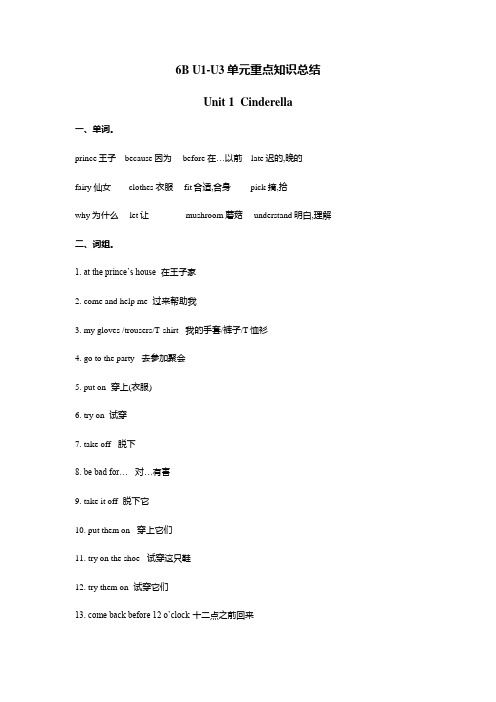
6B U1-U3单元重点知识总结Unit 1 Cinderella一、单词。
prince王子 because因为 before 在…以前 late迟的,晚的fairy 仙女 clothes 衣服 fit合适,合身 pick 摘,拾why 为什么 let让 mushroom 蘑菇 understand明白,理解二、词组。
1. at the prince’s house -在王子家2. come and help me -过来帮助我3. my gloves /trousers/T-shirt -我的手套/裤子/T恤衫4. go to the party -去参加聚会5. put on -穿上(衣服)6. try on -试穿7. take off -脱下8. be bad for… -对…有害9. take it off -脱下它10. put them on -穿上它们11. try on the shoe -试穿这只鞋12. try them on -试穿它们13. come back before 12 o’clock-十二点之前回来14. be sad /happy -伤心/开心15. have a good/great time -玩得开心16. at the party -在聚会上17. have to do sth. -不得不做某事18. have to come home -不得不回家19. visit every house -拜访每一户20. fit sb well -很适合某人21. at 12 o’clock -在十二点22. put on the English play -表演(演出)这个英语剧23. have a drink -喝饮料24. draw a dress for her friend -为她的朋友画一件连衣裙25. read stories -读故事26. have some snacks -有一些零食27. at a snack bar -在零食店28. thirsty and hungry Bobby -饥渴交加的波比29. in the forest -在森林里30. find some mushrooms -发现一些蘑菇31. under the tree -在树下32. pick a big red mushroom -摘了一个又大又红的蘑菇33. pick up the book =pick the book up-捡起这本书34. pick them up -把它们捡起来35. leave a shoe behind -把一只鞋子留下了36. don’t understand why -不明白为什么37. foot hurts -脚疼38. be bad /good for… -对…有坏处/好处39. have to -不得不,必须40. leave…behind -留下;丢下41. have some nice clothes and shoes -有些漂亮衣服和鞋子42. don’t have any nice clothes or shoes -没有漂亮衣服和鞋子43. put on the new clothes= put the new clothes on-穿上新衣服44. take off his white jacket=take his white jacket off -脱下他白色的夹克衫三、句型。
(完整)译林英语6B知识点归纳,推荐文档

译林六年级下大纲Unit 1 The lion and the mouse单词quietly 大声地sadly难过地,伤心地happily开心地,高兴得some day一天loudly 大声地quickly迅速地,快地wake ... up吵醒,叫醒soon不久,很快large 大的weak弱的,软弱的strong强大的,强壮的cheer欢呼deep 深的sharp锋利的,尖的let ... go释放,放开just then就在那时mouse 老鼠walk by走过,路过from then on从那时起bite咬net 网pour ... into把……倒入hit打,击the next day第二天重点词组1. in the forest 在森林里2. walk by 走过;路过3. wake up 醒,醒来4. wake sb. up 把某人叫醒5. be angry with sb. 对某人生气6. the next day 第二天7. be angry at sth. 对某事生气8. want to do sth. 想要做某事9. want sb. to do sth. 要某人做某事10. some day 某一天11. say quietly 小声地说12. sit quietly 静静地坐着13. laugh loudly 大声地笑14. let sb. do sth. 让某人做某事15. catch the lion with a large net 用一口大网捉住狮子16. bite the net with sharp teeth 用锋利的牙齿咬网17. ask sadly 难过地问,伤心地问18. just then 就在那时19. say happily 开心地说20. from then on 从那时起21. become friends 成为朋友22. say excitedly 兴奋地说,激动地说23. make a study plan 制定学习计划24. It doesn’t matter. 没关系。
译林牛津英语6B知识点

六下6B Unit 1 The lion and the mouse 知识点梳理一、短语a study plan 制定学习计划 2. in the forest 在森林里and strong大和强壮day 一天5. walk by 走过;路过6. wake up 醒,醒来wake sb up 把某人叫醒7. be angry with sb 对某人生气be angry at sth 对某事生气8. want to do sth 想要做某事want sb to do sth 要某人做某事9. some day 某一天10. say quietly 小声地说11. so small and weak这么小和弱12. the next day 第二天13. laugh loudly 大声地笑laugh happily开心地大笑14. let sb do sth 让某人做某事let the mouse go 让这只老鼠走开15. catch the lion with a large net 用一口大网捉住狮子16. bite the net with sharp teeth 用锋利的牙齿咬网17. get out 出来,出去get out from the net破网而出help the lion get out帮助狮子逃脱18. ask sadly 难过地问,伤心地问19. just then 就在那时a big hole in the net with his teeth 用他的牙齿在网上弄了一个大洞21. say happily 开心地说,22. from then on 从那时起23. become friends 成为朋友become good friends成为好友happy boy 一个快乐地男孩25. say excitedly 兴奋地说,激动地说shop甜品店27. the boy over there 那边的那个男孩28. It doesn’t matter. 没关系。
新译林英语6B_全册知识点梳理

新译林英语6B_全册知识点梳理1.词汇:-单词:- travel: 旅行- explore: 探索- adventure: 冒险- destination: 目的地- journey: 旅程- experience: 经历- guide: 导游- souvenir: 纪念品- ancient: 古老的- modern: 现代的- famous: 著名的- delicious: 美味的- polite: 有礼貌的- crowded: 拥挤的- strict: 严格的- lazy: 懒惰的- noisy: 吵闹的- peaceful: 宁静的- busy: 忙碌的-短语和表达:- go sightseeing: 观光- take photos: 拍照- try local food: 尝试当地食物- learn about the local culture: 了解当地文化- go on an adventure: 进行冒险- a must-see: 必看的- get lost: 迷路- get around: 到处走走- relax and unwind: 放松和解压2.句型:- What’s your favorite place to visit? (你最喜欢去哪个地方?) - Why do you like it? (你为什么喜欢它?)- I like it because... (我喜欢它是因为...)- Have you ever been to...? (你去过...吗?)- Yes, I have. / No, I haven't. (是的,我去过。
/ 不,我没有。
)- Do you want to go there someday? (你想不想有一天去那里?) - Yes, I do. / No, I don't. (是的,我想去。
/ 不,我不想去。
) - It’s a great place for... (这是一个...的好地方。
新牛津译林6BU2知识点和考点

新牛津译林6BU2知识点和考点《新牛津译林6BU2》是一本高中英语教材,主要针对初三学生。
下面将就该教材的知识点和考点进行介绍。
1.语法知识点:(1)时态:一般现在时、一般过去时、现在进行时、过去进行时、一般将来时等。
(2)被动语态:一般现在时的被动语态、一般过去时的被动语态等。
(3)语态转换:主动语态和被动语态的转换。
(4)比较级和最高级:形容词和副词的比较级和最高级形式及其用法。
(5) 从属连词:引导从句的连接词,如:because, when, if, until 等。
(6)句型转换:一般疑问句和特殊疑问句的转换等。
2.词汇知识点:(1) 动词短语:包括及物动词和不及物动词的短语搭配,如:take care of, make up, get up等。
(2) 名词短语:包括单数名词和复数名词的短语搭配,如:a piece of, a pair of, a lot of等。
(3) 介词短语:表示时间、地点和方式等的介词短语,如:in the morning, at the park, by bus等。
(4) 情态动词:can, could, may, might, should, must等情态动词及其用法。
(5) 固定短语:包括习惯用语、谚语等,如:a piece of cake, once in a blue moon, better late than never等。
3.阅读技巧:(1)猜测词义:通过上下文来猜测生词的意思。
(2)标记关键信息:对于重要信息进行标记,以便理解文章的主旨。
(3)推理理解:通过推理和推断来解答问题,对文章进行深层思考。
(4)阅读理解技巧:包括划线、圈点、概括等技巧,帮助理解文章。
4.写作技巧:(1)书面表达:包括写作文、作文框架和写作模板等。
(2)句子的连贯性:使用适当的连接词和过渡词,使得句子之间的逻辑关系更加清晰。
(3)句子的多样性:使用不同的句式和长短句,使得文章更加有层次感和丰富性。
新译林英语6B_全册知识点梳理重点词汇句型语法知识整理

新译林英语6B_全册知识点梳理重点词汇句型语法知识整理1.重点词汇- realize (v.) 意识到,认识到- pour (v.) 倾倒,涌出- cuisine (n.) 烹饪,烹调风格- spice (n.) 香料,调味品- chopsticks (n.) 筷子- source (v.) 获得,取得- blend (v.) 混合,融合- rely (v.) 依赖,依靠- introduce (v.) 介绍,引入- available (adj.) 可获得的,可用的- afford (v.) 负担得起- vinegar (n.) 醋- whip (v.) 打(鸡蛋、奶油等)- sprinkle (v.) 撒,洒- ingredient (n.) 原料,成分- banquet (n.) 宴会- host (n.) 主人,东道主2.重点句型- Can you realize your dream? 你能实现你的梦想吗?- It's important to pour the soup slowly. 慢慢地倒汤很重要。
- Chinese cuisine is known for its use of spices. 中国菜以其使用香料而闻名。
- Do you know how to use chopsticks? 你知道如何使用筷子吗?- Let's introduce our new classmate. 让我们来介绍一下我们的新同学。
- Is this book available in the library? 这本书在图书馆可以借阅吗?- I can't afford to buy a new car. 我买不起新车。
- Don't forget to sprinkle some sugar on top. 不要忘记在上面撒一些糖。
- The main ingredient for this dish is chicken. 这道菜的主要原料是鸡肉。
(完整word版)小学牛津英语译林版6B英语知识点

(完整word版)小学牛津英语译林版6B英语知识点Unit1 The lion and the mousemouse复数老鼠mice 鼠标mousesbig,large区不large:常指面积或范围大,有广大和众多的含义,其反义词是small。
large 比较正式。
big:常指程度,规模,容积,分量,数量大,含有庞大、笨重的意思,还可表示“伟大,重要”之意,其反义词是little,big较为口语化wake up:up是副词,别可后接代词,代词放中间,名称中间后面都能够放。
the next day 翌日,是指某个特定时刻的后一天,既可指过去,也可指未来tomorrow是指从今天向后的一天,即改日some day 表示未来别确定的某一天,表示未来的时刻状语,所以时态用普通未来时just then 就在那时,表示过去的时刻状语,所以时态用普通过去时from then on 从那时起,表示过去的时刻状语,所以时态用普通过去时from now on 从今以后,表示未来的时刻状语,所以时态用普通未来时副词接在动词后面speak loudly形容词接在名词前面或be动词后面作表语the old manwalk by走过路过let...go 释放敞开pour...into把......倒入in the forest 在森林里large and strong又大又壮so small and weak 那么小和弱let sb. do 让某人干某事well done 干得好get out from the net破网而出become friends变成朋友cheer for...为...而欢呼be good at ...=do well in...擅长in the ground在地上in the hole在洞里look sad看起来伤感with his teeth 用他的牙齿catch(caught)...with用...捉住...have an idea有一具主意(想法)have a good(bad) idea 反义词strong 与weak(同音词week) bite过去式bit hit过去式hitunit2 good habits宾语补脚语:英语中,有点及物动词后接宾语时,还需要加一具词或短语来补充讲明宾语的事情,如此的词或短语叫做宾语补脚语。
- 1、下载文档前请自行甄别文档内容的完整性,平台不提供额外的编辑、内容补充、找答案等附加服务。
- 2、"仅部分预览"的文档,不可在线预览部分如存在完整性等问题,可反馈申请退款(可完整预览的文档不适用该条件!)。
- 3、如文档侵犯您的权益,请联系客服反馈,我们会尽快为您处理(人工客服工作时间:9:00-18:30)。
六下6B Unit 1 The lion and the mouse 知识点梳理一、短语1.make a study plan 制定学习计划2. in the forest 在森林里rge and strong大和强壮4.one day 一天5. walk by 走过;路过6. wake up 醒,醒来 wake sb up 把某人叫醒7. be angry with sb 对某人生气 be angry at sth 对某事生气8. want to do sth 想要做某事 want sb to do sth 要某人做某事9. some day 某一天 10. say quietly 小声地说11. so small and weak这么小和弱 12. the nextday 第二天13. laugh loudly 大声地笑 laugh happily开心地大笑14. let sb do sth 让某人做某事 let the mouse go 让这只老鼠走开15. catch the lion with a large net 用一口大网捉住狮子16. bite the net with sharp teeth 用锋利的牙齿咬网17. get out 出来,出去 get out from the net破网而出help the lion get out帮助狮子逃脱18. ask sadly 难过地问,伤心地问 19. just then 就在那时20.make a big hole in the net with his teeth 用他的牙齿在网上弄了一个大洞21. say happily 开心地说, 22. from then on 从那时起23. become friends 成为朋友 become good friends成为好友24.a happy boy 一个快乐地男孩 25. say excitedly 兴奋地说,激动地说26.sweet shop甜品店 27. the boy over there 那边的那个男孩28. It doesn’t matter. 没关系。
29.lollipop 棒棒糖30.Aesop’s Fables 伊索寓言 31.Chinese idiom book汉语成语书32.many animal stories 许多动物故事33. play table tennis happily 开心地打乒乓球34.be really good at 真得很擅长 be really good at table tennis 乒乓打得好be good at=do well in (后面跟名词或动名词) 擅长/在……做得好35. cheer for sb loudly 大声地为某人欢呼 cheer for them loudly 大声地为他们欢呼36. too excited 太兴奋 be excited at / about…对……很兴奋/ 激动37.hit the ball hard用力击球 38. too deep太深39.find a hole in the ground在地上发现一个洞 in the hole 在洞里40.reach sth 够得着某物 reach it 够得到它reach sp 到达某地 reach the park 到达公园41. have an idea 有一个主意 42. bring some water quickly 很快拿来水43. pour…into…. 把……倒入…… pour it into the hole把它倒进洞44. Well done. 干得很好。
做的不错 45. look sad看起来伤心46. so many如此多……(后加可数名词) so many balls 如此多的球47. so much如此多……(后加不可数名词) so much bread 如此多的面包48. take … to…把…….带到……. take him to an office带他到一个办公室49. become happy 变得很开心 50.help him up帮他上来51. like helping people喜欢帮助人二、难点句子1. The lion was angry and wanted to eat the mouse.这只狮子很生气想要吃那只老鼠。
2. The lion bit the net with his sharp teeth.那只狮子用它的厉牙咬那个网。
3. From then on, the lion and the mouse become friends.从那以后,这只狮子和那只老鼠成了朋友。
4. The next day, two men caught the lion with a large net.第二天,两个男人用一大网抓住了那只狮子。
5.The lion bit the net with his sharp teeth, but that did not help.那只狮子用他的厉牙咬网,但是那无济于事。
6.Here comes the lion.狮子来了。
三、知识点修饰动词的必须用副词1. The lion asked sadly.狮子伤心地问。
2. The mouse said quietly.老鼠平静地说。
3. He laughs happily.他开心地大笑。
形容词+ly= 副词excited excitedly quiet quietly loud loudly sad sadly happy happily 形容词变副词的规则:1.一般情况下直接加“ly”,如 quick---quickly2.以“y”结尾的,先将“y”改成“i”, 再加“ly”,如 happy---happily 少数以 e 结尾的形容词,要去掉 e 再加-ly。
例如:true-truly 等。
但绝大多数以 e 结尾的形容词仍然直接加-ly。
例如:polite-politely,wide-widely 等。
形容词变副词通常是加 ly,其变化有规律可循,请记住以下口诀:一般直接加,“元 e”去 e 加,“辅 y”改 i 加,“le”结尾 e 改 y。
分别举例如下: quick—quickly, true—truly, happy—happily, possible —possibly译林六下Unit 2 Good habits知识点一、四会单词1.habit 习惯2.never 从不te 迟到,晚到4.finish 完成5.tidy 干净的,整齐的6.fast快二、三会单词1. bad 不好的,坏的2. sleepy 困的,困倦的3.slowly 慢速地4.badly 差地,不好三、词组 1.a good boy一个好男孩2.many good habits 许多好的习惯 3.get up early 起床早 4.go to bed late 睡觉迟5.brush one’s teeth 刷牙6.before bedtime 睡觉前7.at home 在家里8.put ……in order把……整理得井井有条9.finish his homework 完成他的家庭作业 10.before dinner 晚饭前 11.listen to his teachers 听他的老师的话 12.do well at home 在家里做得好 13.keep his room clean and tidy 保持他的房间既干净又整洁14.help his parents 帮助他的父母亲 15.some bad habits一些坏习惯16.do one’s homework late 做家庭作业迟 17.go to bed early 睡觉早18.feel sleepy感觉困倦 19.know……well 对……非常了解st night 昨晚 21.walk fast 走得快 22.four short horses 四匹矮马 23.run through 跑过 24.wash our face 洗脸e to see her 过来看她 26.go into走进 27.big and clean又大又干净 28.a lot of books and toys许多书和玩具 29.under the bed 在床下 30.run slowly跑得慢 31.walk slowly走得慢四、句型1.He gets up early in the morning.他早上很早起床。
2.He goes to school early in the morning. 他早上很早上学。
3.He never goes to bed late.他从不晚睡。
4.I walk fast in the street. 我在街上快速地走着。
5.We / They do well at home. 我们/ 他们在家做得好。
6.He has many good habits. 他有许多好的爱好。
7.Wang Bing always puts his things in order.王兵总是把东西整理得井井有条。
8.He usually finishes his homework before dinner. 他通常在晚饭前完成他的家庭作业。
9.He sometimes feels sleepy in the morning. 有时他在早上感觉困倦。
10.Did you go to bed late last night , Liu Tao ? 你昨天晚上睡觉迟吗,涛?五、语法1.一般现在时的构成一般现在时肯定式的构成,应注意不同人be动词或实义动词的正确使用。
如:实义动词 be 动词 I like it. I am a student. You like it. You are a student.He/ She likes it. He/ She is a student. We / You / They like it. We / You / They are students. (注意,当主语为第三人称单数时,动词也要为第三人称单数。
)2.动词第三人称单数构成方法:类别构成方法例词一般情况在动词后加s like-likes play-plays以辅音字母+y结尾变y为i study-studies carry-carries以s,x,sh,ch,o结尾加es watch- watches fish-fishes巧学妙记:动词第三人称单数变化口诀一般情况词尾“-s”加; o, s, x , sh, ch 结尾“-es”不能差;辅音加y,变y为i,再把“-es”来加;多读多练牢记它。
